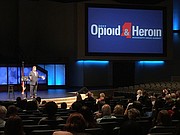Thursday, August 3, 2017
Gov. Phil Bryant said he did not want to wait until January to start implementing some of the recommendations from his Opioid Task Force, which the director of the Mississippi Bureau of Narcotics, John Dowdy (left), is leading. Photo courtesy Cam Bonelli
JACKSON — The Governor's Opioid and Heroin Study Task Force released its recommendations Wednesday, Aug. 3, to help Mississippi curb the number of overdoses and death that the opioid epidemic is causing.
Gov. Phil Bryant called the epidemic one of the most complicated issues facing the state because opioids—painkillers prescribed by doctors and dentists around the state—are technically a legal substance. Bryant said there have been 95 overdoses to date this year in Mississippi.
"We need to find a way to reduce those deaths and reduce the distribution of this product," he said.
The task force, which is made up of representatives for doctors, nurses, pharmacists, dentists, lawyers, law enforcement and mental-health care, presented 41 recommendations in total. The majority of recommendations are for the health-care-provider community, and for treatment, education and prevention.
Dr. Randy Easterling told the task force Wednesday that one of the big fixes prescribers need to look at is understanding and prescribing differently for acute versus chronic pain. The task force recommends that medical providers prescribe no more than a three-day supply of opioids for acute, or short-term, pain.
Dr. Carroll McLeod, a physician at the Jackson Anesthesia Pain Center, mentioned one patient who had received 99 prescriptions from 32 prescribers in one year as an example of why the prescription monitoring program, or PMP, is so important. The program is statewide, so any medical provider can access it before prescribing a patient medication.
"Opioids are necessary in certain situations, but every time an opioid is written, you should be mindful of, 'Do I really need to write this for this person?'" McLeod said.
Many of the proposed solutions for the medical community and prescribers will not require legislation, and will only take licensure boards changing standards to fix.
Other fixes, including enhanced penalties for heroin dealers, will require legislation to fix. The task force also recommends that those who go before the court for selling controlled substances be ineligible for drug court. Gov. Bryant agreed.
To Avoid Funerals, Mississippi Drug Summit Targets Opioid, Heroin Addiction
Attorney General Jim Hood believes he has been to several funerals of people this year who have died from opioid overdoses, but said that no one talked about the cause.
"The dealer was always the guy we were trying to get to. ... There's a big difference between the user and the dealer. Sometimes the user finds there way into being a dealer, but if you're distributing and selling these types of drugs ... (drug courts) were not designed for distribution and sales, so that is a good recommendation," Bryant said.
Some of the recommendations will require additional funding, including adding staff at the Mississippi Crime Lab.
"I think there's a reality of the societal cost; the lives are the most important cost, but the cost of enforcement and the cost to the medical community, the cost to the pharmaceutical community, the cost of lost productivity, all that has occurred because of this," Bryant said.
"(It) is shocking, the amount of money that taxpayers are spending now on this epidemic that we are now dealing with, so we are going to have to look at ways we can help fund those agencies, those organizations that are out responding to them."
Email state reporter Arielle Dreher at [email protected] and follow her on Twitter @arielle_amara.
Read more stories at jfp.ms/addiction.


